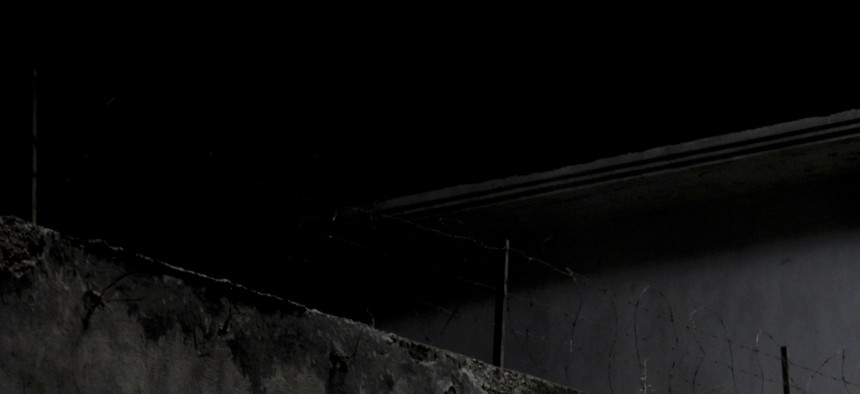
Jonathan Olley/Columbia Pictures
'Zero Dark Thirty:' Hunting Down Osama Bin Laden All Over Again
So much of this movie is real, and in new and surprising ways, which makes it newsy and relevant here and now, three weeks before its release. A review of Kathryn Bigelow's thorough and satisfying depiction of the most famous manhunt of our time.

Subscribe
:
Newsletter
Facebook
LinkedIn
When, late on a Sunday night, Barack Obama went on television to announce that Osama bin Laden, mastermind of the September 11th terrorist attacks, had been killed by Navy SEALs, Americans, or at least those paying attention, were seized by a strange dichotomy. There were those who celebrated — most famously, right outside the White House — and those who felt that maybe celebration was the wrong response, inexact and tasteless. Our biggest bogeyman — an emblem, terrorism incarnate — had been taken out, but did we really want to cheer for death? And what did Osama bin Laden amount to, exactly, in 2011, nearly ten years after he'd pulled off his most infamous act? We were quickly distracted from that quandary by the action-movie plot of it all, as we learned details about a place called Abbottabad, about the mighty SEAL Team 6, about the strange things found in bin Laden's compound (porn, namely). But what was lost in all these exciting bits of narrative, perhaps, and in the torn emotions of a country unsure of what, exactly, it had "won," were the real nuts and bolts and process of the years-long hunt for this Big Bad Man. And so, in an effort to sift through the historical data and explain to us how this all went down, director Kathryn Bigelow has made Zero Dark Thirty , a long and sober and thoroughly compelling account of CIA people treading moral lines and sifting through piles of nothing to find one seven-foot Saudi.
Our follow car through this nearly-a-decade span is a young CIA officer named Maya, played with theatrical vigor by Jessica Chastain and based on a real person — a lot of this movie is real, and in new and surprising ways, which makes it newsy and relevant here and now, three weeks before its release. At the beginning of the film, Maya is new to the field, arriving in Pakistan and going straight to a brutal water-boarding interrogation. She's hesitant and off-put — she looks away at particularly gnarly moments — but Maya is not, it's carefully pointed out, without spine or conviction. That the film opens with such a graphic depiction of torture is both unnerving and oddly welcome. Yes, OK, here you go. Right out front for all to see. This is how information was found, this is the anonymous, spirited away origin of the great patriotic deed. And Bigelow is careful not to editorialize on the matter. We are simply seeing what happened. But there is a sense, throughout the opening sequence, that bigger issues are afoot. Whether Bigelow or her screenwriter Mark Boal are pro-torture in cases like these, or vehemently against it entirely, is not really the point; that America employed such ugly means, by way of our version of the good guys, very much is: The usefulness of torture is one of Zero Dark Thirty 's several hard and unflinching and deliberately presented truths. Maya is eventually inured to this brutality (and by extension so are we), singlemindedly determined as she is to wrestle some justice into the world.
We continue to watch Maya over the course of about eight years, as American foreign policy creaks and groans under the weight of two wars and leads grow cold or disappear around dark corners. The bulk of Zero Dark Thirty is fits and starts, progress met with terrible setbacks. Maya befriends, in an aloofly professional sense at least, some of her colleagues, all played by strong actors like Jason Clarke, Harold Perrineau, and the indispensible Jennifer Ehle, and they aid her in her search while also warily detecting a bit of mania. (A comparison to Homeland 's Carrie Matheson is tempting to make here, but I think that silly show doesn't really have a seat at this serious, real-life table.) Maya, though, is our Final Girl, and as she loses colleagues to violence and the siren song of an easy life in bureaucratic Washington, her focus grows ever sharper. In one of the film's strange moments of emotional exposition, Maya tells a special-ops guy that she believes she alone has survived and maintained because she is meant to see this thing to its end. There's a whiff of righteous, almost religious conviction in that sentiment, but Bigelow doesn't dwell on it for long. We only get to know the inner Maya in brief glimpses; most of our time is spent peering over her shoulder and watching her pursuit.
NEXT STORY: Presidential Management Fellows are mostly happy






